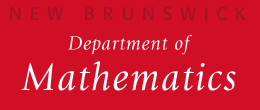Mathematics Major/Minor Brochure: Choosing Courses to Fit Career Goals
|
Mathematics Undergraduate Program |
The department encourages all its majors to take a diverse program, and students will usually sample courses from a variety of categories before they decide whether to concentrate on one or more areas. The syllabi for mathematics courses are at http://www.math.rutgers.edu/courses/ . However, students should be aware that syllabi for upper-division courses are often not very detailed; instructors can introduce variations into the contents of the course while remaining within catalogue descriptions. The best way to get an idea of the details is usually to consult the intructor.
It is important to take Math 300 as early as possible, since it is a prerequisite for the abstract courses Math 311, 350, 351, 361, 435, 441, and 461.
The following list suggests one possible grouping of upper-level math courses by area.
- Algebra and Logic: 350, 351, 352, 356, 361, 461.
- Analysis: 311, 312, 403, 423.
- Continuous ("Classical") Applied Mathematics: 321, 373, 374, 403, 423, 429.
- Discrete Mathematics with Applications: 338, 354, 355, 428, 429, 454.
- Geometry and Topology: 432, 435, 441, 442.
- Probability and Statistics: 424, 429, 477, 478, 481.
It is impossible to make a single, rigid list of the courses a mathematics major should take. Experience has suggested, however, that the following guidelines offer good choices for students who already have some idea of the type of program they would like to pursue. All math majors are encouraged to talk to the head adviser on this subject. See also the recommendations on related areas, below.
Preparing for Graduate Study
(a) A student planning to study abstract mathematics at the graduate level is advised to take as many courses as possible from this list: Math 411-412, Math 451, Math 403, 432, Math 477, and Math 441. Students interested in undergraduate seminars or honors courses such as 300:H or Math 451-452 should discuss the matter with a member of the department's honors committee.
(b) The honors track has higher requirements regarding courses and grades. Each honors track student's program of study must be approved by the honors committee. For details, see the honors track web page, http://www.math.rutgers.edu/undergrad/Honors/Track/index.html.
(c) A student planning to study applied mathematics at the graduate
level is advised to take Math 477 as early as possible, and also to take Math
311-312, and other courses in applicable mathematics, such as Math 336, 338,
354 or 453, 357, 428, 454. It is also advisable to take courses in such areas
of application as physics, biology, and economics, and computer science.
Applied or Industrial Mathematics
(d) Students interested in the area of application in some of our dual degree BA/MA programs (statistics, economics, operations research, industrial and systems engineering, mathematics education, mathematical finance) should consult the mathematics department and the other department as early as possible. They should also look at the information on dual degree programs.
(e) For students planning to seek employment as mathematicians in industry, experience has shown that Math 477 is crucial: it is a prerequisite for several important courses. Students should take 477 as early as they can so that they are prepared to take courses for which it is a prerequisite. They should also take at least one course in mathematical modeling, such as Math 321, 338, or 424. Also courses drawn from among Math 348, 354, 357, 373, 428, 429, 454, 478 and 481. It is also advisable to take courses in such areas of application as physics, biology, and economics—and especially in computer science, a field in which many mathematics majors find career opportunities. Computer Science courses drawn from among 112, 211, 314, 344, 416, 431, 436, and 452 are particularly recommended. Some firms are only willing to consider applications from persons who have had at least two terms of computer science.
Actuarial or Financial Mathematics
(f)
There is no separate actuarial major. A good preparation for a career as an
actuary begins with a major in mathematics, together with a appropriate
courses in economics and statistics. The electives in mathematics should also
be chosen with this career goal in mind. To see the list of courses presently
recommended by Rutgers, and other useful information on the subject, see the
actuarial information page.
Some current publications of the Society of Actuaries dealing with their examination program, etc., are available at the undergraduate mathematics office, Hill 303. A student interested in a career as an actuary should begin by acquiring these publications and becoming acquainted with their contents; he or she should also refer to the home page of the Society of Actuaries. For advice see Professor Dan Ocone, Hill 518, telephone (732) 445-2390 x1320, http://www.math.rutgers.edu/~ocone/.
Math + Bio, Math + CS, Math + Stat
(g) Students interested in combining mathematics with biology, computer science, or statistics should consider the interdisciplinary programs listed above.








